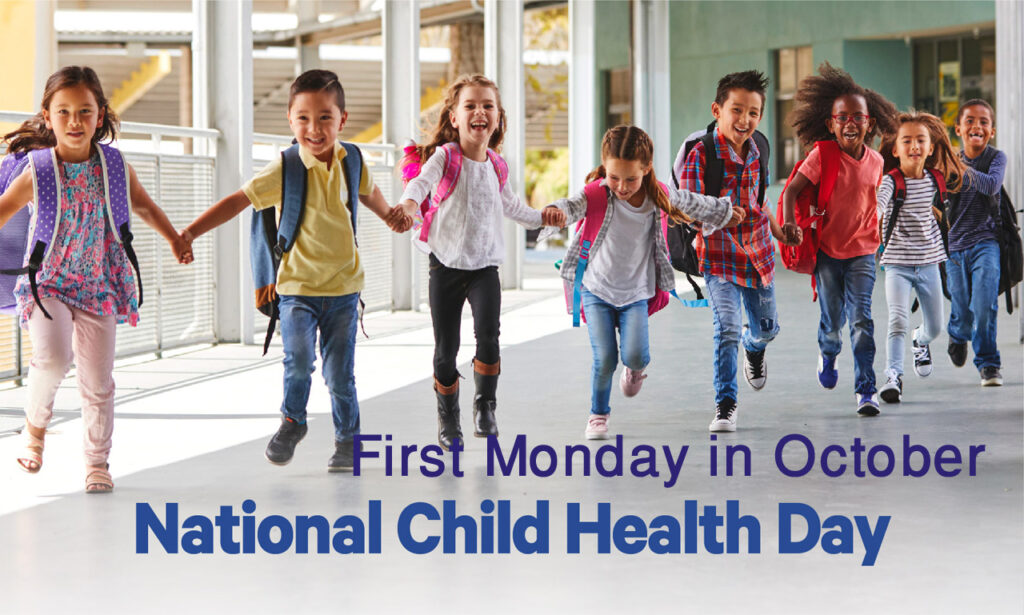National Child Health Day is an annual observance dedicated to promoting the health and well-being of children across the United States. Celebrated on the first Monday in October, this day serves as a vital reminder of the importance of ensuring that every child has the opportunity to grow up healthy, safe, and thriving. The focus of this day encompasses various aspects of child health, including physical, mental, and emotional well-being, and aims to raise awareness about the challenges many children face.
2024-2035 the First Monday in October:
7 October – 2024 First Monday in October, 6 October – 2025 First Monday in October, 5 October – 2026 First Monday in October, 4 October – 2027 First Monday in October, 2 October – 2028 First Monday in October, 1 October – 2029 First Monday in October, 7 October – 2030 First Monday in October, 6 October – 2031 First Monday in October, 4 October – 2032 First Monday in October, 3 October – 2033 First Monday in October, 2 October – 2034 First Monday in October, 1 October – 2035 First Monday in October.
History of National Child Health Day
National Child Health Day has its roots in the early 20th century when public health officials recognized the need to improve the health conditions of children. The day was first established in 1928, following the recommendation of the U.S. Children’s Bureau. The initial purpose was to raise awareness about children’s health issues and encourage communities to take action to improve health outcomes for children. Over the years, National Child Health Day has evolved, but its core mission remains the same: to promote the health and welfare of children.
Importance of National Child Health Day
- Raising Awareness: One of the primary purposes of National Child Health Day is to raise awareness about child health issues. This includes understanding the various health challenges children face, such as obesity, mental health disorders, and access to healthcare services. By educating parents, caregivers, and communities, the observance encourages proactive measures to protect children’s health.
- Encouraging Preventive Care: National Child Health Day emphasizes the importance of preventive care. Regular check-ups, vaccinations, and screenings are crucial for early detection and treatment of health issues. This observance promotes the idea that prevention is more effective than treatment, encouraging parents to prioritize their children’s healthcare.
- Addressing Health Disparities: Many children in the U.S. face significant health disparities based on socioeconomic status, race, and geographic location. National Child Health Day highlights these disparities and calls for collective action to ensure that all children have access to necessary health services and resources, regardless of their background.
- Promoting Healthy Lifestyles: The day also focuses on encouraging healthy lifestyle choices among children. This includes promoting physical activity, balanced nutrition, and mental health awareness. Engaging children in healthy activities and educating them about nutrition can instill lifelong habits that contribute to their overall well-being.
- Supporting Mental Health: In recent years, there has been a growing recognition of the importance of mental health in children. National Child Health Day underscores the significance of mental health awareness and encourages parents and caregivers to recognize signs of mental health issues. By fostering open conversations about mental health, we can reduce stigma and provide children with the support they need.
How to Observe National Child Health Day
- Educational Activities: Schools, community centers, and healthcare providers can organize educational activities focused on child health. Workshops, seminars, and health fairs can provide valuable information to parents and caregivers about the importance of regular check-ups, vaccinations, and healthy habits.
- Health Screenings: Organizations can host health screening events for children. These screenings can include vision and hearing tests, immunizations, and physical exams. Providing free or low-cost services can help ensure that all children receive necessary healthcare.
- Healthy Eating Campaigns: Schools can implement healthy eating campaigns to promote nutritious food options. This can include cooking classes for children and their families, as well as initiatives to increase the availability of healthy food in schools.
- Physical Activity Events: Community organizations can host fun physical activity events, such as family fitness days, sports tournaments, or nature walks. Engaging children and families in physical activities can promote a healthy lifestyle and strengthen community bonds.
- Mental Health Awareness: Hosting workshops or webinars focused on mental health can provide parents with resources and tools to support their children’s emotional well-being. Schools can incorporate mental health education into their curricula, helping children understand the importance of mental health and how to seek help when needed.
- Social Media Campaigns: Utilize social media platforms to raise awareness about National Child Health Day. Share information, resources, and personal stories to engage a wider audience and encourage discussions about child health.
- Advocacy and Policy Change: Use National Child Health Day as an opportunity to advocate for policies that promote child health. This can include pushing for improved access to healthcare services, funding for mental health programs, and policies that address food insecurity among families.
The Role of Parents and Caregivers
Parents and caregivers play a crucial role in promoting child health. On National Child Health Day, they are encouraged to take the following steps:
- Schedule Regular Check-Ups: Ensure that your child receives regular health check-ups and vaccinations. These appointments are essential for monitoring growth, development, and overall health.
- Promote Healthy Eating: Encourage healthy eating habits at home by providing nutritious meals and snacks. Involve children in meal planning and preparation to help them develop a positive relationship with food.
- Encourage Physical Activity: Incorporate physical activity into your child’s daily routine. Whether it’s playing outside, joining a sports team, or taking family walks, staying active is crucial for children’s health.
- Talk About Mental Health: Open up conversations about mental health with your child. Teach them that it’s okay to express their feelings and seek help if they need it. Create a supportive environment where they feel safe discussing their emotions.
- Be a Role Model: Children learn by example. Model healthy behaviors, such as regular exercise, balanced eating, and stress management techniques, to inspire your child to adopt similar habits.
- Educate Yourself: Stay informed about child health issues by reading articles, attending workshops, and following reputable organizations focused on child health. Knowledge is key to making informed decisions for your child’s well-being.
Conclusion
National Child Health Day is a significant observance that highlights the importance of ensuring that every child has the opportunity to lead a healthy life. By raising awareness, promoting preventive care, addressing health disparities, and encouraging healthy lifestyles, this day serves as a vital platform for improving the health of children across the nation. Parents, caregivers, and communities can come together to celebrate this day by taking proactive steps to prioritize child health, ultimately fostering a healthier future for all children.


This horoscope prediction is still a top secret! Blind clairvoyant Saint Sergius from Ternopil, Ukraine – decided that his gift should not be wasted, so he remotely helps everyone anyone who wants it. People live in different parts of the country and the world, and not always they have the opportunity to visit the clairvoyant in person. Saint Sergius only needs a small amount of information to read to read your destiny imprint and give you a diagnostic session. It’s completely free of charge!
It is impossible to discuss horoscope with friends and relatives, because so YOU change the true the course of things, violating your destined path.
Get horoscope on our website! Click on link – https://intznak.site/goroskop/xrumer/1/
Get horoscope on our website! Click on link – https://intznak.site/goroskop/xrumer/1/
Get help
No thanks